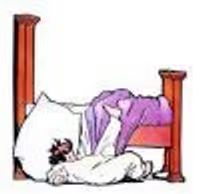Sweeney Todd: Hero or Villain?
#75re: Sweeney Todd: Hero or Villain?
Posted: 2/6/06 at 1:30pmI never meant to imply that it was wrong to deceive Turpin, and I'm sorry if it read that way. I only brought that up as it shows that Johanna is capable of deception, and, thus, not entirely innocent. Even if the action itself is completely justified (which in this case, it certainly is), the fact that she CAN and DOES deceive quite readily sets her apart from characters like Tobias and Lucy, who are more gullible, and trusting. Innocence, in this case, is a hindrance - which is why these 2 characters are completely destroyed.
#76re: Sweeney Todd: Hero or Villain?
Posted: 2/6/06 at 1:36pm
I agree completely Chica, I think my issue was more with how your post combined in my head with one much farther back that certainly seemed to place culpability on disobeying authority, which as we agree is sometimes justified and necessary. ![]()
One thing that I was interested in with Doyle's staging is, is it true that Lucy is not in control and manipulating events to her own ends as well.
Surely in the past she has been raving, and only has the brief moments of lucidity, but in the Doyle version I get the impression that she to is aware and calculating, not the extent of the villains, but certainly in some manner. Has anyone else noticed that?
#77re: Sweeney Todd: Hero or Villain?
Posted: 2/6/06 at 1:45pm
Hmmm..interesting. Could you elaborate on the idea that she's so mad that she's not actually in control? I'm not sure I understand what you mean by that. I've always felt that Lucy isn't really in control of anything, but is still very aware (even in other versions of the show). She is, after all, (and rather ironically) the voice of lucidity, who's able to see the death that surrounds the pie shop.
She's certainly much less of the rambling lunatic in Doyle's version of the musical. But I'm not entirely sure if she's calculating, or "too" aware. I'd like to hear more of your thoughts on that.
#78re: Sweeney Todd: Hero or Villain?
Posted: 2/6/06 at 1:53pm
Typo + confusing wording= my entire post was a total mess. ![]()
It seems to me in the Doyle version that she is somewhat in control, she does know and despise Lovett of course, but there seems to be a great deal of maliciousness in her interactions with Lovett. I think it is a very subtle and external thing, but serves to lessen her status as an "innocent."
#79re: Sweeney Todd: Hero or Villain?
Posted: 2/6/06 at 1:56pmOk, yes, I see what you mean. And I agree. Doyle's world is one much darker, and more seethed in corruption. Even Tobias' delivery of "I'd rip it apart with my bare fists, I would" is incredibly creepy (and shows that he, too, harbors some darkness). I still stand by the notion that he's an innocent, but it's interesting that Doyle chose to make this a much darker "Sweeney Todd", in which no one is really excempt from some kind of guilt.
riggs
Swing Joined: 11/3/05
#80re: Sweeney Todd: Hero or Villain?
Posted: 2/6/06 at 3:47pmAfter I saw this production (it was at the tail end of previews so it may have changed) I thought that Toby was the most heroic, so I agree with those who say he is the least evil of the bunch. After reading this thread, it seems to me that all of the characters think that they are being heroic as one point or another. Toby has nothing's gonna harm you Sweeney thinks we all deserve to die Lucy roams the streets of london warning people about lovett, Lovett thinks she is protecting sweeney from the reality of his wife's demise... Maybe it's more about dualism.
#81re: Sweeney Todd: Hero or Villain?
Posted: 2/6/06 at 4:33pm
Sweeney is a tricky beast because it's written in the style of old fashioned melodramas. I think the reason we're having such a hard time typifying Anthony is because he's the character most overtly written in the style (besides the judge, Pirelli, and the beadle). He's the hero who falls in love with the heroine and endures countless perils to save her without much motivation. The thing is in this Sweeney the normal hero (Anthony) is a supporting character and the protagonist of the story is the supposed villain (Sweeney). In turn, the characters who would normally play bit parts in a traditional telling of this kind of story (like Mrs. Lovett, Toby, Johanna) instead are humanized and given depth. Which is a really interesting spin on storytelling, I think. I don't know much about the Bond play, or if the precedent for telling the story from Sweeney's pov was in effect long before the 70s, but I still think it's a neat way to tell a story.
Now that I think about it, Anthony is kind of an incidental character. He's a plot motivator, but there's not much else to dig into. The beggar woman is kind of the same way (existing mostly for the twist at the end).
joey
#82re: Sweeney Todd: Hero or Villain?
Posted: 2/6/06 at 4:40pmI think the only villian is the judge.... i mean sweeney goes nuts but geez can you blame him!
#83re: Sweeney Todd: Hero or Villain?
Posted: 2/6/06 at 5:14pm
sooo how's the revival? i'm sure that's been asked already but i'll ask anyways...haha.
#84re: Sweeney Todd: Hero or Villain?
Posted: 2/6/06 at 5:25pm
The revival is FABULOUS! lol
I don't really feel like going into a detailed analysis right now. But it's really, really fantastic. I'm sure someone else will fill you in.
Videos






